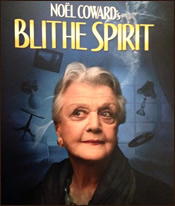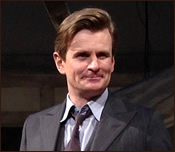Review: “Blithe Spirit” by Noël Coward, starring Angela Lansbury and Charles Edwards
 It’s difficult for me to say when I first became aware of Angela Lansbury. Perhaps it was due the Disney film “Bedknobs and Broomsticks” in which she played the trainee witch Eglantine Price. It may have been when I saw her on television in the long running series “Murder She Wrote”. She certainly caught my attention as Raymond Shaw’s domineering mother in the 1962 film, “The Manchurian Candidate”: her speech about making “Martial Law seem like anarchy” chilled me to the bone. On the other hand, I was captivated by her luminescent beauty when she portrayed Princess Gwendolyn in Danny Kaye’s 1956 comedy, “The Court Jester”. All told, she has been a constant on my television screen and in the cinema; any film or programme that featured her was indicative of quality.
It’s difficult for me to say when I first became aware of Angela Lansbury. Perhaps it was due the Disney film “Bedknobs and Broomsticks” in which she played the trainee witch Eglantine Price. It may have been when I saw her on television in the long running series “Murder She Wrote”. She certainly caught my attention as Raymond Shaw’s domineering mother in the 1962 film, “The Manchurian Candidate”: her speech about making “Martial Law seem like anarchy” chilled me to the bone. On the other hand, I was captivated by her luminescent beauty when she portrayed Princess Gwendolyn in Danny Kaye’s 1956 comedy, “The Court Jester”. All told, she has been a constant on my television screen and in the cinema; any film or programme that featured her was indicative of quality.
She is now 88 years old. However, if anyone thought that the years she’s accrued would deter her from continuing to captivate audiences, they are mistaken. She is now on stage in a new version of Noël Coward’s “Blithe Spirit” and it’s obvious from the get-go that her powers remain undiminished.
I was fortunate to have a very good vantage point for all the action: I sat in the front row. I believe this was the first time I’ve ever had such a close up view of the actors. From that angle, one can see the greasepaint and little flickers of emotion playing out across the protagonists’ faces. In a lesser production, this could shatter the illusion; in this instance, proximity enhanced it.
“Blithe Spirit” is the tale of a middle-aged novelist named Charles Condomine (played by veteran actor Charles Edwards) who is living quietly with his somewhat prim and regimented wife Ruth (portrayed by Janie Dee) in a small village in Kent. Charles and Ruth have a comfortable relationship, seemingly devoted though devoid of passion; they have seen and experienced enough of life to realise that it’s sufficient to have a partner that is not constantly irritating and upon which one can rely.
Seven years prior to the events in the play, Charles was married to a much more physically accommodating and vivacious, if less reliable, woman named Elvira. Elvira died after a bout of pneumonia, apparently from a fit of laughter while listening to a comedy programme on the radio.
Charles wants to write a murder mystery with a medium as a main character; as part of his research he invites the eccentric Madame Arcati (Angela Lansbury) to dinner and encourages her to perform a séance. Ms. Lansbury fills the stage the moment she steps onto it: I found that my gaze was solely fixed on what she was doing, and I was hanging off every word she said. She found the right pitch and timbre for her odd, wise yet endearing character which made her three dimensional as opposed to a cardboard cut out. A lack of depth and interiority can be a temptation in “drawing room comedies”, some of which are more about the delivery of witticisms than the development of characters and plot. Ms. Lansbury also displayed her continuing talent for physical comedy: as part of going into a trance, she moved about the stage, waved her arms and did high kicks worthy of a Monty Python sketch.
Madame Arcati’s gyrations, incantations and table tapping yield a terrible mistake: they summon the ghost of Elvira (played with sultry panache by Jemima Rooper) to come back into Charles’ life.
 It’s at this moment that the character of Charles comes into his own: he presents the dilemma of a man who essentially has two wives, one living and one passed on, possessing contrasting virtues, both present at the same time and both wanting him to themselves. He intimates that he feels terribly guilty about the death of one wife, and yet he says he doesn’t want to be unkind to the one who is alive. That said, the play is sufficiently honest to show a moment in which Charles makes it clear that he would like both wives to be around, engaging him in a sort of cosmic ménage a trois. Charles is also insufferably vain throughout: it’s unclear if his concern for either wife stems from actual love, his desire to maintain his self-image or just to stop being nagged. The play suggests it’s a combination of all of the above, with love being the lesser ingredient in the mix.
It’s at this moment that the character of Charles comes into his own: he presents the dilemma of a man who essentially has two wives, one living and one passed on, possessing contrasting virtues, both present at the same time and both wanting him to themselves. He intimates that he feels terribly guilty about the death of one wife, and yet he says he doesn’t want to be unkind to the one who is alive. That said, the play is sufficiently honest to show a moment in which Charles makes it clear that he would like both wives to be around, engaging him in a sort of cosmic ménage a trois. Charles is also insufferably vain throughout: it’s unclear if his concern for either wife stems from actual love, his desire to maintain his self-image or just to stop being nagged. The play suggests it’s a combination of all of the above, with love being the lesser ingredient in the mix.
Charles as the play’s locus is one of its few features which truly date it. “Blithe Spirit” was first performed in 1941 and thus some of its sexual politics are archaic; nevertheless, there is a gleam of awareness that radiates from the dialogue. For all his self-love and his wives’ supposed love for him, Charles is a relentlessly hapless character, and whatever he attempts to mollify one wife only serves to irritate the other; Charles Edwards expertly captures this wretched bewilderment, vanity and self-delusion in his performance.
The other characters are just as well drawn and portrayed: Ruth may be stern and unyielding but she is not a stereotypical harridan, rather, she is someone who has had to learn to stand up for herself after being mistreated far too often. Elvira at first appears to be a male fantasy, an eternally youthful and voluptuous sexual partner, but this façade eventually drops as she’s revealed to have ambitions, schemes and inconsistencies. The relations between men and women are shown to be a battle, unequal because of the times in which they live, constantly churning and only bearable because of the laughter that can be had through tears and the cosseting provided by bourgeois comforts.
This potent elixir is delivered via Noël Coward’s skilful writing, his humour providing the sweetener that makes the bitter medicine palatable. I laughed quite a lot during the performance, I thought about what the play was really trying to say only afterwards. While it was on, it was a raucous romp, but long after the last bow was taken, it moved me.
Some may say that this interpretation reads too much into Coward’s work: however, it must be noted that the play doesn’t come with a stereotypically happy ending. Rather, all the characters are sent back into their corners, alone, whether in this life or the next. Love does not triumph, neither does virtue; it’s doubtful either exists in this play. Rather, there is a brief, misogynistic paean to personal liberty, a hasty exit, and the curtain falls.
I have heard rumours that this will be Ms. Lansbury’s last outing on stage; after this, the fine thread she has woven through our culture may finally taper out. It could be said that “Blithe Spirit” is also about saying “farewell” and the realisation that a conclusion inevitably comes to any state of affairs. Given this, perhaps she could not have chosen a better work with which to exit.


